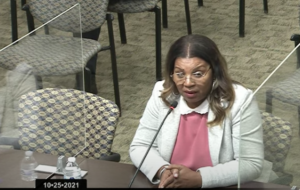
When someone is injured or killed by police, there are press conferences, news reports and sometimes even protests. Investigations are opened. But then, people’s attention moves on.
The Community Oversight Board is thinking about ways to support victims of police violence, so they don’t feel forgotten.
Eleven people have been shot by Nashville police since the city created the civilian-run agency to investigate the department, and police have used force against hundreds of others.
 Courtesy MetroNashville YouTube
Courtesy MetroNashville YouTube Metro Nashville Community Oversight Director Jill Fitcheard speaks at a Metro Human Relations Commission meeting in late October.
Oversight director Jill Fitcheard is the one who gets the calls from loved ones desperate for information after officers hurt or kill someone. At a Metro Human Relations Commission town hall last month, she said they’re often searching for help they can’t find anywhere else.
“We have a group of survivors who are also victims, and what we do is we forget about them,” Fitcheard said. “And you know what their No. 1 issue is? They haven’t heard from anyone. They haven’t heard from the mayor’s office. They haven’t heard from the DA’s office. They haven’t heard from anyone, but they’ve heard from us.”
Fitcheard says Nashville needs to rethink its approach to police accountability — not just to investigate allegations of misconduct, but also to support those affected by officer violence. Fitcheard hopes to hire at least one social worker to help people process their grief and anger, as well as provide updates on their cases.
“What do we do as a community? What do we do as a city? We have to address that, because we haven’t made them whole,” she said.
But with a budget of less than $1.6 million the agency doesn’t have the money for it. Fitcheard says she’s exploring different funding options, including more money from the city in next year’s budget or even requesting a portion of the police department’s budget, which stands at $246 million, to ensure that their staff mirrors MNPD’s internal Office of Professional Accountability. At a recent board meeting, members also discussed applying for federal grants for victims’ services.
WPLN News reached out to the mayor’s office, district attorney’s office, police department and Tennessee Bureau of Investigation regarding their protocols to follow up with people affected by police use-of-force cases.
The TBI and the DA’s office both say they have coordinators who provide information to all crime victims and connect them with resources. Metro Police says people receive updates from the department if they file a complaint against an officer.
The mayor’s office says it is “committed to partnering with the COB to find innovative ways to meet the needs of our residents.” In the meantime, officials have recommended that the oversight agency refer people to the Family Safety Center, which provides free counseling to victims of crime.

